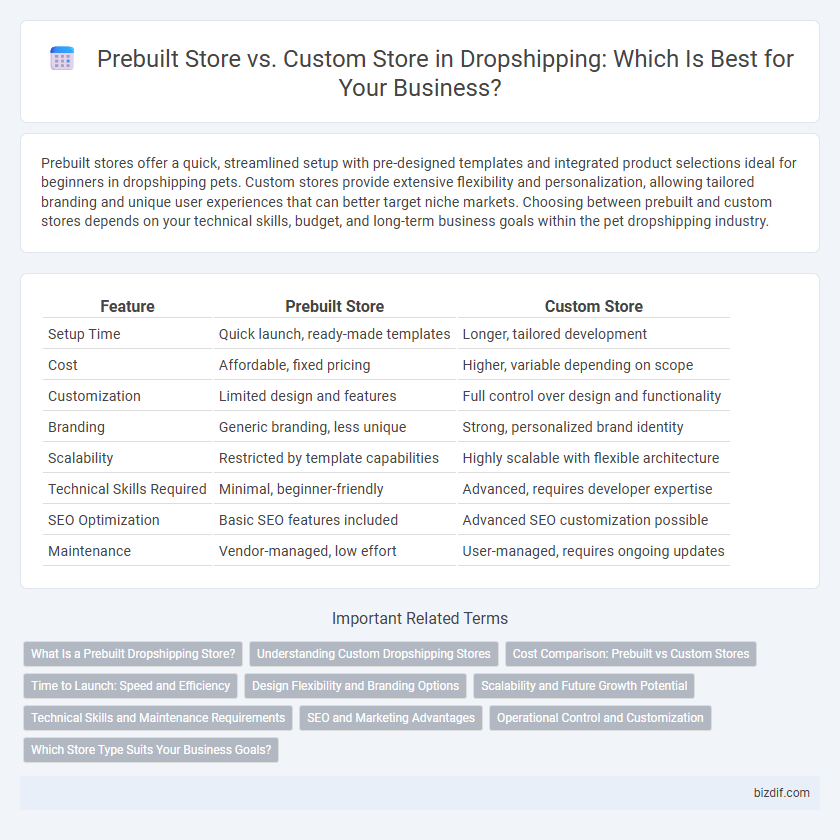Prebuilt stores offer a quick, streamlined setup with pre-designed templates and integrated product selections ideal for beginners in dropshipping pets. Custom stores provide extensive flexibility and personalization, allowing tailored branding and unique user experiences that can better target niche markets. Choosing between prebuilt and custom stores depends on your technical skills, budget, and long-term business goals within the pet dropshipping industry.
Table of Comparison
| Feature | Prebuilt Store | Custom Store |
|---|---|---|
| Setup Time | Quick launch, ready-made templates | Longer, tailored development |
| Cost | Affordable, fixed pricing | Higher, variable depending on scope |
| Customization | Limited design and features | Full control over design and functionality |
| Branding | Generic branding, less unique | Strong, personalized brand identity |
| Scalability | Restricted by template capabilities | Highly scalable with flexible architecture |
| Technical Skills Required | Minimal, beginner-friendly | Advanced, requires developer expertise |
| SEO Optimization | Basic SEO features included | Advanced SEO customization possible |
| Maintenance | Vendor-managed, low effort | User-managed, requires ongoing updates |
What Is a Prebuilt Dropshipping Store?
A prebuilt dropshipping store is a ready-made online shop designed with pre-selected products, automated inventory management, and integrated payment systems, enabling entrepreneurs to launch quickly without extensive setup. These stores often include professionally crafted themes and preloaded marketing tools, streamlining the path to starting a dropshipping business. Leveraging platforms like Shopify or WooCommerce, prebuilt stores reduce initial development time compared to custom stores, which require personalized design and product sourcing.
Understanding Custom Dropshipping Stores
Custom dropshipping stores offer tailored product selections, unique branding, and optimized user experiences designed to target specific niches effectively. These stores allow advanced integration of marketing tools, personalized design elements, and custom domain names, which enhance customer trust and conversion rates. By investing in a custom dropshipping store, entrepreneurs can differentiate themselves from competitors relying on generic prebuilt templates, enabling scalable growth and stronger brand identity.
Cost Comparison: Prebuilt vs Custom Stores
Prebuilt dropshipping stores typically cost between $200 to $1,000, offering a quicker setup with basic features and limited customization, while custom stores start around $2,000 and can exceed $10,000 depending on design complexity and functionality requirements. Prebuilt options often include integrated product listings and automated tools, reducing initial investment but limiting scalability and brand uniqueness. Custom stores provide tailored user experiences and advanced features, justifying higher costs through enhanced conversion rates and long-term growth potential.
Time to Launch: Speed and Efficiency
Prebuilt stores offer rapid deployment with ready-made templates and integrated apps, allowing entrepreneurs to start selling within hours. Custom stores require more development time for unique design and tailored features but provide personalized branding and functionality. Choosing between the two depends on whether time-to-market or customization is the primary priority for the dropshipping business.
Design Flexibility and Branding Options
Prebuilt stores offer limited design flexibility with fixed templates that restrict branding customization and unique user experiences. Custom stores provide extensive design freedom, enabling tailored layouts, personalized branding elements, and seamless integration of unique visual identities. Brands seeking distinct market positioning benefit from custom stores through enhanced control over aesthetics and customer engagement.
Scalability and Future Growth Potential
Prebuilt dropshipping stores offer quick launch advantages but often lack the scalability needed for long-term growth due to limited customization options and standardized product selections. Custom stores provide greater flexibility in design, product range, and marketing integrations, enabling seamless scalability and adaptation to evolving market trends and customer preferences. Investing in a custom store supports sustainable growth by facilitating advanced SEO strategies, personalized user experiences, and efficient inventory management systems.
Technical Skills and Maintenance Requirements
Prebuilt dropshipping stores require minimal technical skills, offering ready-made templates and integrated apps that streamline setup and reduce ongoing maintenance. Custom stores demand advanced expertise in web development, coding, and design, along with continuous upkeep to manage updates, security, and performance optimization. Choosing between the two hinges on balancing ease of use and control over technical customization and maintenance responsibilities.
SEO and Marketing Advantages
Prebuilt stores offer streamlined SEO settings with pre-configured meta tags and optimized product descriptions, enabling faster indexing and better initial search engine rankings. Custom stores provide greater flexibility to implement unique SEO strategies and tailored content, enhancing long-term organic traffic and brand authority. Marketing advantages in custom stores include personalized user experiences and advanced integrations with analytics and CRM tools, leading to higher conversion rates and customer retention.
Operational Control and Customization
Prebuilt stores offer limited operational control and customization options, often restricting merchants to predefined templates and features that streamline the setup process but limit flexibility. Custom stores provide extensive operational control, allowing businesses to tailor workflows, integrate unique functionalities, and create personalized user experiences that align closely with brand identity. Choosing between prebuilt and custom stores depends on the balance between ease of deployment and the need for comprehensive customization in dropshipping operations.
Which Store Type Suits Your Business Goals?
Prebuilt stores offer quick setup with ready-made product selections and templates, ideal for entrepreneurs seeking fast market entry and streamlined operations. Custom stores provide greater flexibility in design, branding, and product choices, catering to businesses aiming for a unique customer experience and long-term growth. Choosing between prebuilt and custom dropshipping stores depends on your priorities: speed and simplicity versus customization and scalability.
Prebuilt Store vs Custom Store Infographic

 bizdif.com
bizdif.com